Saving Private Ryan Review
Saving Private Ryan Review
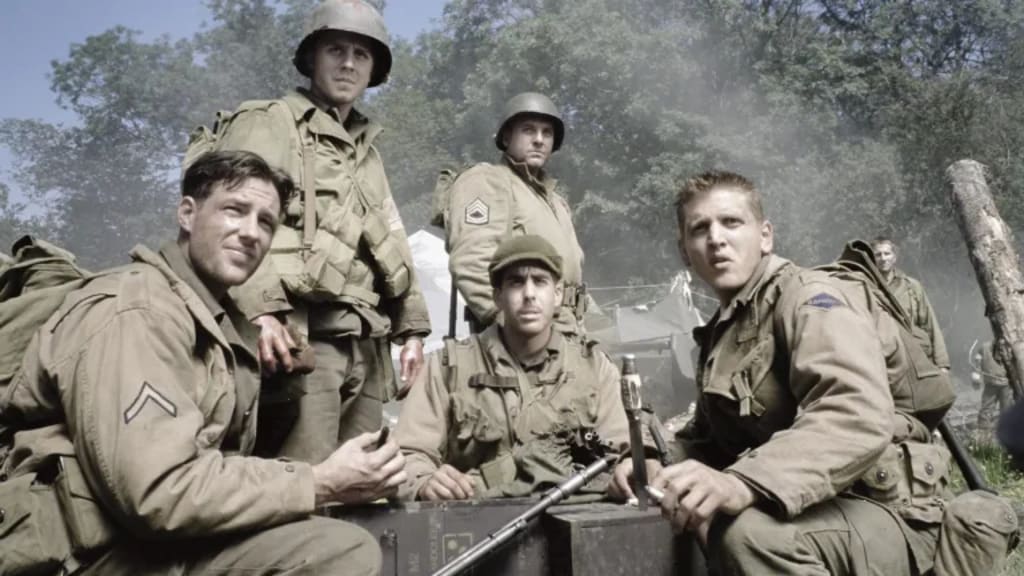
We have seen it in Robert Capa's photographs, in war documentaries, in movies: the invasion of Normandy was the beginning of the end of German rule in Europe. In the early morning of June 6, 1944, the allied British and Canadian troops occupied Gold, Juno and Sword beaches, while the Americans entered through Utah and Omaha beaches in Vierville-sur-mer. The longest day(1962), by Darryl Zanuck, is a representative example of the tapes that Hollywood has offered us on the subject: an anonymous battle, without faces, of choreographed deaths, filled with false, hollow and false acts of courage. There is no blood, no shouting, no confusion, the soldiers seem to have been practicing the assault on the beach several days in advance, almost with the script in hand. Where are the two thousand four hundred casualties that the United States Army suffered during that day? Sublimated for the sake of art. Hidden, until now.
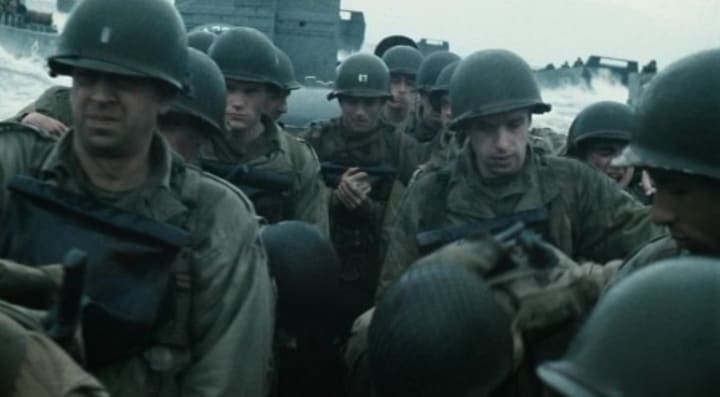
In Saving Private Ryan brief and unnecessary prologue introduces a flashback that takes us directly to the war, more precisely to the sea, where the landing in Omaha is about to take place. We are in the midst of the soldiers but neither their attitude nor their presence is that of marble and corpulent beings destined for glory: fear invades them, fear consumes them, the waves make them dizzy ( frame 1). There is trembling in his hands, sweat, discomfort, an infinite anguish. They feel it, they manage to transmit it to us. And the beach draws near and death with it: almost half an hour follows, which gives no respite, which overwhelms, which makes us close our eyes. Spielberg has spared no resource to make us travel back in time, so that we feel that we are witnessing, from the comfort of our chair, a moment that history (and cinema) has been responsible for filling with heroism and courage, when What we see are cries of pain, blood, doubt and terror.
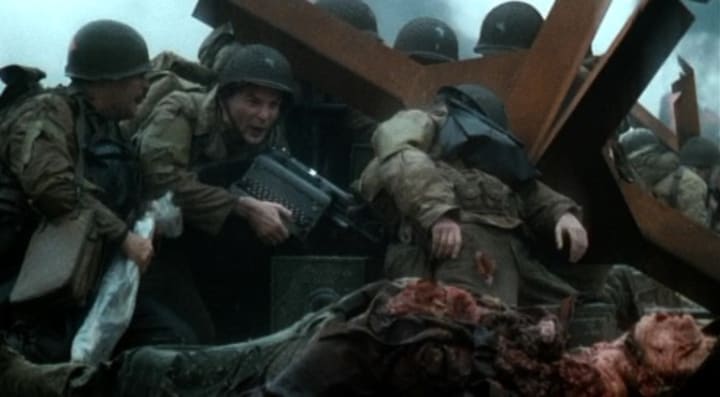
The camera trembles, rises, falls, falls into the water, barely gets up and stumbles again: that subjective camera is constituted in our eyes, because there we are, up to our chests in the water, unable to move due to the weight of the weapons, with German bullets hitting a nearby body, with the sea that now tastes of blood. And on the beach, chaos. Wounded men, dead men, screams, explosions, mud, mutilated bodies, a soldier picking up his arm from the sand, another with all his abdominal contents exposed; we don't know where to look, where to hide, what to do ( frame 2). Graphics like never before, Steven Spielberg and his photographer Janusz Kaminski manage to move us and unsettle us with their images, which take a personal and individual level to a conflict that we are used to seeing from a bird's eye view. The scene does not seem to end, it continues to add opprobrium, violence and anger. With compelling intensity and unabashed technical and narrative efficiency, the director is showing us a memorable piece of cinema, no matter how terrifying and devastating his mise-en-scène may seem.
And then a pause introduces the supposed mission that is going to be entrusted to a small group of soldiers who survived the invasion of Normandy. Then a different story begins, in which this heterogeneous human group searches for a soldier who has earned (in the most tragic way possible) the right to return home. The script, written by Robert Rodat, is inspired by the story of Fritz Niland, a soldier who had to be taken out of combat for the same reasons that the film describes and who was found in the war zone by an army chaplain, the Reverend Francis Samson. But that search is an apology, that's not the end of the film, that's just the reason that starts it.
It is a choral film, where its multiple protagonists, united by chance in a common enterprise, try to represent and reflect the different faces of a war from the most human point of view possible. We pass from the generalized concept of troops as something that is a common mass of men who follow orders and who lack any introspection, to analyze each one of its members, to characterize them and recognize them in their individuality. What we see makes this film a painfully human experience: a captain, a sergeant and six soldiers facing their doubts, their fears, the duty that must be fulfilled and in which they see no object or justification. We accompany them among grasslands,
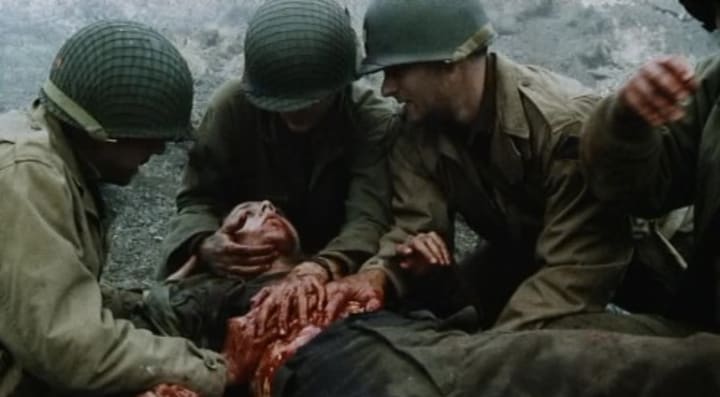
The story from the personal side thus rests on three axes: Captain Miller, and soldiers Ryan and Upham. The first, played with great control and a notorious low profile by Tom Hanks, is a hesitant and silent officer, perplexed by an uncomfortable war waged in a land that is not his and in a profession that seems foreign and absurd. Far from the archetype of man with the words duty and country nailed to the forehead, Captain Miller's attitude is much more reflective and pragmatic: since they are there, well, then you have to resign yourself to doing things right. At one point he confesses to us and reveals (not without some regret) that in his hometown he is an English teacher, and we are not surprised: his soldiers have somehow been his students (and he has been able to teach several lessons) , although they have not been so much within the military orthodoxy, at least they have been of humanity and respect. See him cry at the death of his men ( frame 3), observe the inconceivable tremor of his hands in a dangerous situation, his determination in the face of what he considers fair and his final immolation make this character one of the most complex and best structured in Steven Spielberg's filmography, which is characterized exactly by everything the opposite: flat, one-dimensional characters, barely sketched like the protagonists of Amistad (1997) and on many occasions caricatured to serve as a backdrop for the special effects.
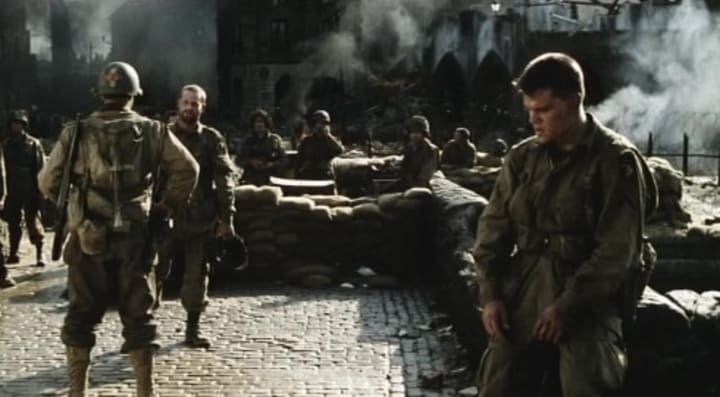
Private Ryan (Matt Damon) represents the handful of idealists who came to war with a patriotic commitment that does not understand other reasons and that they put above any emotional or family ties. For this reason, he is not an unreal character either (ideologies are nourished by men like these) but from a civil point of view their actions in some way subvert a certain logic (the one that says that it is better to be safe at home and not on the battlefront). Furthermore, this is the typical soldier that war movies have already turned into a stereotype and that has helped to strengthen the myth of military invincibility (and callousness), as absurd as it is archaic. To show us that his search is not exactly the goal of the film, Spielberg strips his appearance of any kind of stylistic adornment: he is found almost by chance, without any heroic makeup, without any martial introduction to the music of John Williams ( frame 4 ); nor does the battered patrol that finds him seem one iota moved by the fact. There is more the relief of knowing that at least they will be able to return to his base.
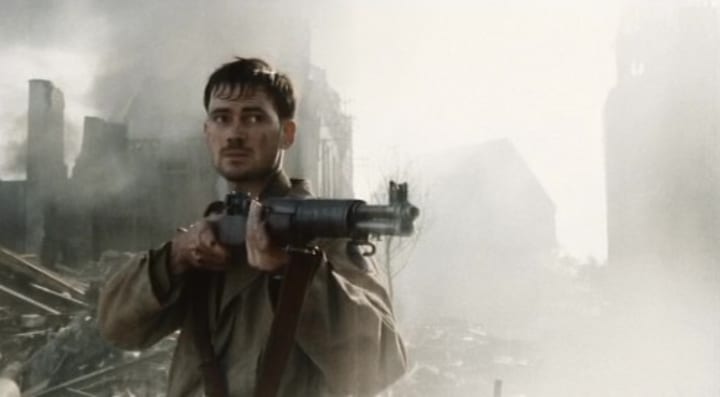
Spielberg dedicates a very good part of the story to a member of that patrol: it is Private Upham (Jeremy Davies), recruited for his ability to speak French and German rather than for his qualities as a combatant, which he completely lacks. This type of character (a hackneyed cliché in war movies) is the object of innumerable ridicule throughout the films and then quickly dies or, in the best of cases, is transformed by miraculous designs into the best shooter or the most skilled and risk of soldiers. None of that happens here and, siding with a character he seems to have felt close to, Spielberg achieves the portrait of a man who is not only ethically impeded from killing someone in cold blood, but also physically incapable of killing someone. , to do it. The film stops at this man, lets us look at him and share the anguish of the terrible moral duel that was lived inside him. In the end, his act of courage is above all a play of chance, unrepeatable and unique (frame 5 ). No false metamorphoses: for this man the war was fought on more fronts than those visible to the naked eye.
Coupled with his rich portrayal of his characters, Saving Private Ryan joins the tradition of movies that celebrate defeat. This is not a pessimistic film, but it takes the risk of being faithful to what would have been produced in real conditions and not to what we are used to seeing in the cinema: unprecedented last-minute solutions, impossible rescues, resurrections of the that we thought already dead. His approach recalls and evokes a beautiful film by Edward Zwick, Glory Times(1989) where the defeat of its protagonists was both their triumph and their redemption. Spielberg has bet on something similar, knowing that he was exposing himself to the public turning his back on a film that does not end with a typical happy ending, but I think the gamble is justified if we think that otherwise the film would have betrayed a discourse narrative whose tone we could find out (and suffer) from the first minutes.
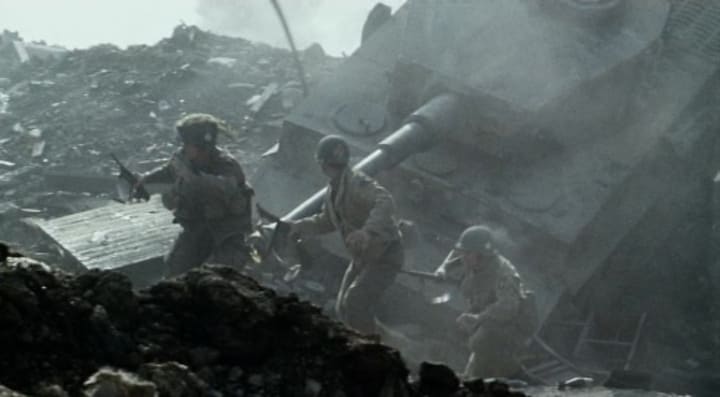
However, the director could not resist the desire to end with a caramelized, tearful and patriotic ending that brings nothing to this film and detracts from its greatness. These are the contradictions of an author who still oscillates between his commercial commitments and the creative risk that he is so afraid of assuming, and that he only rarely manages to bring to the surface. Moreover, in the last part of the film, when the soldiers face the tanks, we can almost remember a scene from Jurassic Park : the dwarfed men facing a beast that surpasses them in size and strength, and that is now metallic, but that behaves like another dinosaur ( frame 6 ).
But the final balance is more than positive. It is not quite a masterpiece, but it is, above all, a sensitive, courageous and very hard look at an inexhaustible and still current theme, brought to us with impeccable craftsmanship, dignity and great narrative skill by a man whose talent as a true director he is second only to his overwhelming income as an entrepreneur. And believe me, that weighs.
About the Creator
Muhammad Fahad
I Am A Movie Enthusiast And I Love Talking About Them..


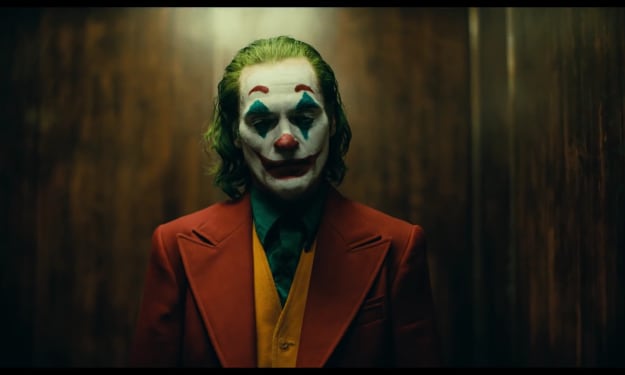



Comments
There are no comments for this story
Be the first to respond and start the conversation.